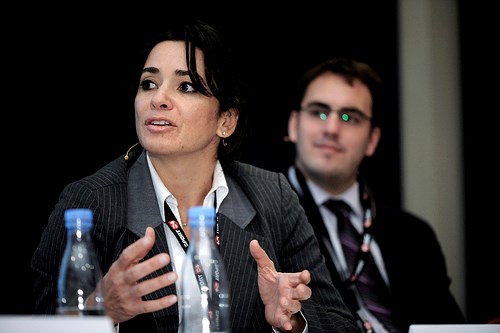The legal cost of hosting a mega-event

Carolina Cézar Ribeiro from the Brazilian Congress Chamber of Deputies talks about the legal legacies of hosting the FIFA World Cup. Photo: Play the Game / Thomas Søndergaard
31.10.2013
By Marcus HoyBefore such an event is allowed to go ahead, governing bodies like FIFA, UEFA and the IOC insist on strict legal preconditions being in place. These requirements, the conference heard, raise uncomfortable questions about democracy and executive privilege.
Carolina Cézar Ribeiro, a Legal Consultant at the Brazilian Congress Chamber of Deputies, told Play the Game that a number of legal hurdles had to be surmounted before the 2014 FIFA World Cup could go ahead.She said Brazil’s Parliament was called on to consider and approve the specific legal guarantees required by FIFA to hold the event.
The law allowed for tax exemptions not only to FIFA itself, she said, but also for all its commercial partners and associated companies, regardless of whether they are domiciled inside or outside Brazil.
Other requirements included handing over all responsibility for ticketing arrangements to FIFA, and only by intervention of Parliament the allocation of discounted tickets for OAPs and students was guaranteed. Civil liability, consumer protection and project design rules could also be affected, she said.
“There will be a football legacy, but there will also be a political and legislative legacy,” she said. Karolina Tetlak, an Assistant Professor of Law at Poland’s Warsaw University, told a similar story regarding the buildup to Euro 2012.
Her nation’s consumer protection agency is currently involved in a legal battle with UEFA over the organisation’s allocation of tickets to handicapped spectators, she said, which could result in a precedent that could apply to other governing bodies.
Ryan Gauthier, a PhD candidate, at Rotterdam Erasmus University’s Department of International and European Law, pointed out that labour rights also suffered during preparations for mega-events.
Forced labor, as defined by the withholding of identity documents, threats of denunciation to immigration authorities and debt bondage, was evident in preparations for the forthcoming Winter Olympics in the Russian city of Sochi, he claimed.
“Labor conditions are rarely addressed by the international sporting organisations apart from no-strike provisions,” he said.
Gauthier proposed that an ombudsman or a monitoring body be established to ensure that labour laws are respected during preparations for sporting mega-events. “We have a very real problem and the simple solutions aren’t working,” he said.
UK-based event manager Gorana Gavrilov pointed out that the role of volunteers should also be taken into account during mega-events. They too had specific motivations and expectations, she said, which should be respected by event organisers. They should not simply be viewed as “free labour”, Gavrilov said.





